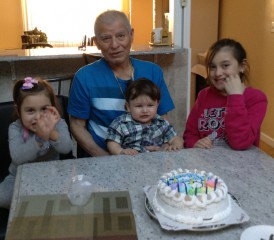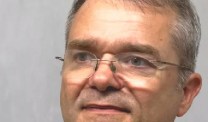Proud Immigrant and Mesothelioma Survivor Teaches Family About Attitude
Cancer & CaregivingWritten by Tim Povtak | Edited By Walter Pacheco

Will L. spends a lot of time now worrying about his father’s health. He often wonders how different things might be if his father had never left Ecuador 45 years ago to create a better life for his family.
He also wonders how something so good turned out so bad. How did the American dream become an American nightmare?
Malignant pleural mesothelioma changed his perspective on a lot of things.
“If my father had stayed in Ecuador, raised a family there, this never would have happened to him, and that saddens me and my brothers,” Will said from his home in New Jersey. “But he won’t let us talk like that around him. There is no bitterness. He’d do it the same way all over again. He’s proud that his children grew up in the United States.”
His father, Antonio L., who celebrated his 73rd birthday last month, becomes a six-year mesothelioma survivor in May, a milestone that makes him a rarity but also sounds an alarm. Not many pleural patients live this long.
“My father always said ‘this was the land of opportunity,’ ” Will said. “He taught us to never live with regret. Maybe that’s why he has lasted. Doctors aren’t sure why, exactly. But it’s starting to show on him now. It is taking its toll. He knows what’s out there, but he wants us to stay strong.” Will and Antonio’s last name is being withheld over privacy concerns.
Antonio was 28, the 11th of 13 children in a poor, Ecuadorian family, when he saved enough money in 1969 for a one-way plane ticket to New York City, where he landed alone, with only hopes and dreams in the small knapsack he carried.
He luckily met one Spanish-speaking person on the trip who knew somebody who knew somebody, who was an assistant manager at a manufacturing plant nearby in New Jersey. When he deplaned, he held tightly to the name and address he was given. It was his ticket to a future.
Job Was the Key
Within days, he had landed that factory job, where he stayed for 35 years, making corrugated cardboard, often volunteering for extra shifts that included cleaning up the snow-like asbestos dust that was everywhere.
Antonio returned briefly to Ecuador after two years in New Jersey, with fancy clothes on his back and money in his pocket, returning to sweep his childhood sweetheart off her feet. They married and returned together, expecting to raise a family and live happily ever after.
In the early ’70s, no one working at the factory realized how toxic the asbestos was, that it caused a variety of long-term respiratory issues, including mesothelioma cancer. He didn’t know until his malignant mesothelioma diagnosis almost 40 years later, long after becoming an American citizen.
“Even though he’s sad about getting the disease, he wants us to know he did it for us. That job is what allowed us to do what we’ve done in life. In his mind, he sees it as a sacrifice a father made for his family,” Will said. “He was proud of his job.”
Antonio and his family prospered in the New York-New Jersey area, occasionally returning to visit his many brothers and sisters in Ecuador. He even bought a second home there, planning a happy and healthy retirement close to where he was born. But cancer, and the deterioration it caused, has changed everything.
Retirement Plans Were Changed
“That’s probably what upsets him the most, that he won’t be able to spend his retirement years where he wanted in Ecuador,” Will said. “He worked all his life for that, but now it won’t happen because of this disease.”
By the time Antonio was diagnosed in May 2008, the cancer already had spread, eliminating the option of potentially-curative surgery. He has done multiple rounds of chemotherapy, which temporarily stunted the growth in his chest each time, working surprisingly well.
He believes that a positive attitude, a supportive family and a visualization technique he read about, have been imperative in his fight. He visualized the chemotherapy attacking the cancer. He often visualized doing things he loved to do in the past, even when the chemotherapy was knocking him off his feet and the stabbing pains in his chest were returning.
“What he did, coming to the United States on his own long ago, leaving everything behind, that really took a lot of guts,” Will said. “I don’t know if I could do something like that. Not sure many people could. I’ve always admired him for that.”
Will, who has a young family and a job of his own, often tends to his father and mother, who still live nearby. Will is the one who found Asbestos.com and the services it provides for mesothelioma patients, including literature and guidance in Spanish that his father could read and understand.
Depending how he tolerates his current chemotherapy cycle, Antonio and his wife are hoping to travel to Ecuador one final time in July, returning home to see everyone again. Will is hoping and praying it will happen.
“I really think that’s what keeps him going now, hoping for one more trip,” Will said. “I think seeing himself back in Ecuador, surrounded by family one more time, is what drives him now. I know he won’t give that up.”






